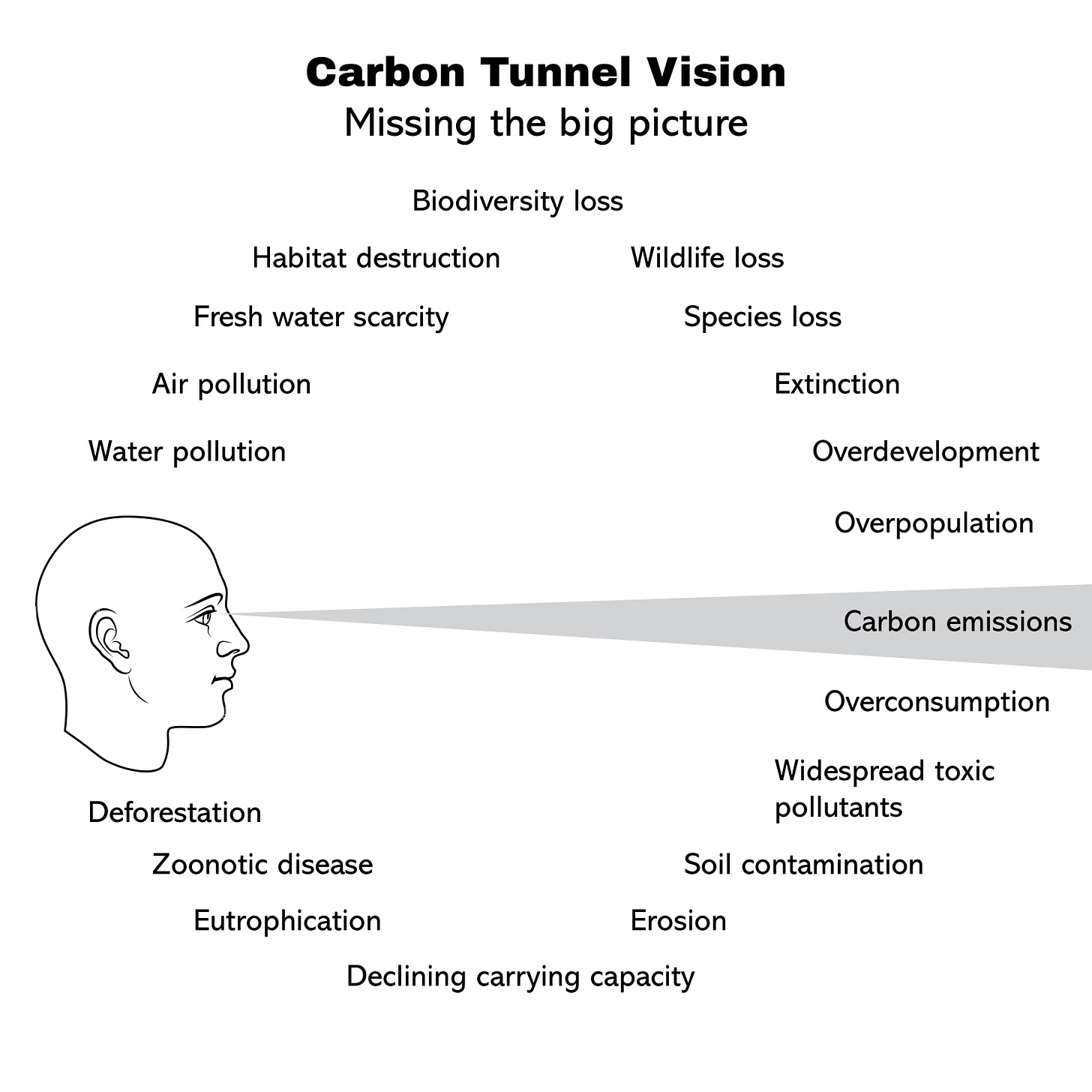The Dangerous Failure of “Net Zero”
How Climate Promises Became a Moral Hazard
As the cracks in the global “net zero” narrative begin to show, it’s becoming painfully clear that what was sold as a climate change solution is now backfiring, badly.
For years, political leaders, corporations, and well-meaning environmental groups have championed decarbonization schemes: electrify everything, invest in renewables, and trust in innovation to lead us to a greener future. But here’s the truth: it was never going to work. The global economy still runs on roughly 90% fossil fuels, a number that has barely budged in decades despite trillions in investment, thousands of emissions pledges, and countless glossy reports.
The promise of net zero was not just a false hope. It became a moral hazard; a seductive, feel-good distraction that allowed industrial society to imagine it could keep growing indefinitely without confronting the ecological consequences. If we just build enough solar panels and electric cars, the thinking went, we can have our cake and eat it too. But infinite growth on a finite planet is a fantasy, no matter how “green” the energy source.
Now, as electricity costs climb, grids strain, and emissions keep rising, people are waking up, not to the reality of ecological limits, but to the realization that they’ve been lied to. And in their disillusionment, they are beginning to throw the baby out with the bathwater. The failure of net zero is being used to discredit the very idea of climate change or environmental concern.
Matt Ridley and other commentators have seized on net zero’s failures to argue that the environmental movement is fundamentally flawed. In April 2025, former UK Prime Minister Tony Blair added his voice, calling net-zero-based policies “doomed to fail” if they depend on rapidly phasing out fossil fuels or require meaningful lifestyle reductions—insisting instead that only techno-optimism, from carbon capture to nuclear energy, offers a viable path forward.
In the United States, Michael Shellenberger plays a similar role. Once aligned with environmental activism, he now argues that climate change is overstated, net zero is unrealistic, and fossil fuels remain essential for prosperity, positions that have made him a regular guest on conservative media and a favorite among climate skeptics.
Taken together, this growing chorus frames climate change ambition as naïve and dangerous, redirecting public discourse toward fossil-fueled techno-optimism while ignoring the far deeper crisis of ecological overshoot.
This growing backlash has found traction not just because net zero is politically fraught, but because it was conceptually flawed from the start. Critics like Ridley and Shellenberger are right to point out its failures, but they misdiagnose the cause. The problem isn’t that the goals were too ambitious; it’s that they were never grounded in physical or ecological reality. To understand why net zero is unraveling, we need to look beyond emissions accounting and toward the broader systemic crisis; a crisis rooted in energy expansion, ecological overshoot, and the myth of decoupled growth.
Historian Jean‑Baptiste Fressoz, in More and More and More, dismantles the myth of energy and materials transitions: there never was one and there never will be one. He shows how every new energy source (from wood to coal, oil to renewables) has historically added to, not displaced, older sources, driving total energy and material consumption ever higher. The illusion of a clean switch has become an intellectual scandal, shielding business‑as‑usual and delaying meaningful reductions.
Ecological economist William E. Rees, creator of the ecological footprint, frames humanity’s trajectory as advanced overshoot: consuming resources and producing waste beyond Earth’s regenerative capacity. In Overshoot: Cognitive Obsolescence and the Population Conundrum (2023), Rees argues net‑zero policies reinforce denial, adding “to the dangerous illusion that a smooth energy transition is underway.” He calls for coordinated degrowth, including drastic reductions in energy/material throughput and human population.
The real danger is in rejecting the false solution, we ignore the real problem. Net zero failed not because climate change is a hoax, but because it refused to confront the deeper, more uncomfortable truth: we are in ecological overshoot. Our civilization is over-consuming the planet’s capacity to regenerate. Climate change is only one symptom, alongside many others, including habitat loss, pollution, biodiversity collapse, and the accelerating sixth mass extinction.
By focusing narrowly on emissions rather than the bigger picture, net zero ambitions obscured this broader view. Worse, they reassured the public that no real sacrifices were necessary, that we could decarbonize without downsizing, electrify without relocalizing, and innovate our way out of planetary limits.
We now face a dangerous crossroads. Disillusionment with the promises of decarbonization could have sparked a radical rethinking of growth, consumption, and human exceptionalism. Instead, it’s being used to justify more drilling, more extraction, more denial.
The truth is that decarbonization, if it is to mean anything real, must start with degrowth. A global economic system predicated on perpetual expansion—regardless of the energy source—is inherently unsustainable on a finite planet. There is no path to a livable future that doesn’t include massive reductions in material throughput, energy use, and industrial scale.
Until we are honest about that, every new green promise will just be another mirage, another shiny object drawing our eyes away from collapse.



Bravo, Elisabeth. I'd welcome hearing what you consider our possible next ten steps...to backtracking from ecological overshoot.
Thx, Elisabeth! The pic is worth a 1000 words and akin to what Marshall McLuhan mentions in "The Gutenberg Galaxy", "Dominance of one sense = hypnosis."